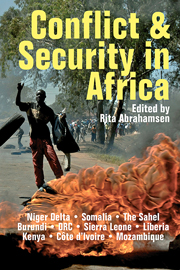Book contents
- Frontmatter
- Contents
- Preface
- Notes on Contributors
- Permissions
- 1 Introduction: Conflict & Security in Africa
- Section One Global Economies, State Collapse & Conflicts
- Section Two Global Security Governance
- 7 Somalia: ‘They Created a Desert & Called it Peace(building)’
- 8 The Burundi Peace Negotiations: An African Experience of Peace-Making
- 9 Blair's Africa: The Politics of Securitisation & Fear
- 10 Abductions, Kidnappings & Killings in the Sahel & the Sahara
- Section Three Cultures of Conflict & Insecurity
- Index
7 - Somalia: ‘They Created a Desert & Called it Peace(building)’
from Section Two - Global Security Governance
Published online by Cambridge University Press: 05 October 2013
- Frontmatter
- Contents
- Preface
- Notes on Contributors
- Permissions
- 1 Introduction: Conflict & Security in Africa
- Section One Global Economies, State Collapse & Conflicts
- Section Two Global Security Governance
- 7 Somalia: ‘They Created a Desert & Called it Peace(building)’
- 8 The Burundi Peace Negotiations: An African Experience of Peace-Making
- 9 Blair's Africa: The Politics of Securitisation & Fear
- 10 Abductions, Kidnappings & Killings in the Sahel & the Sahara
- Section Three Cultures of Conflict & Insecurity
- Index
Summary
Explanations of Somalia's extraordinary 20-year crisis – featuring civil war, state collapse, failed peace talks, violent lawlessness and warlordism, internal displacement and refugee flows, chronic food insecurity, piracy, regional proxy wars and Islamic extremism – have tended to fall in one of two camps. One assigns blame primarily to internal factors perpetuating the country's crisis; the other emphasises the role of external drivers. Both have ample evidence on which to draw. Accurate analysis of the Somali crisis must account for both internal and external conflict drivers and the mutually reinforcing dynamics that have developed between them.
A case can also be made that the relative salience of these conflict drivers has changed over time. In the early years of the Somali disaster, internal factors – warlordism, clannism, poor leadership, economic constraints and others – were decisive in perpetuating the civil war and undermining external peacebuilding efforts. External policies in the 1990s at times made things worse – by failing to provide timely diplomatic mediation when it was most needed in 1991, and intervening clumsily in the UN Operation in Somalia in 1993-94 – but were not a root cause of the crisis. However, in recent years external actors have come to play an increasingly central role in perpetuating or exacerbating the Somali crisis. In some instances, external actors have intentionally set out to cultivate divisions and lawlessness in Somalia, or to use the country to play out proxy wars against regional rivals.
- Type
- Chapter
- Information
- Conflict and Security in Africa , pp. 97 - 107Publisher: Boydell & BrewerPrint publication year: 2013



